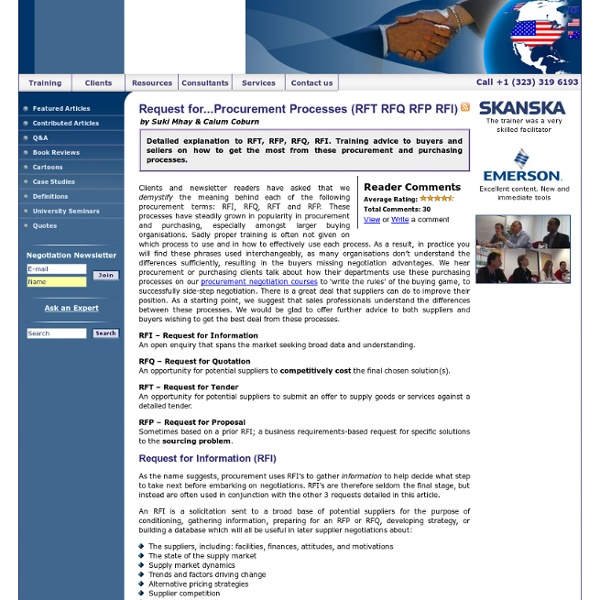RFQ RFT RFP RFI - Procurement Processes Negotiation Experts - Tendering

Home Page - The Chartered Institute of Purchasing and Supply
Welcome to PASIA Procurement and Sourcing Institute of Asia
Negotiation Strategies & Skills Course - Negotiation for Executives
Management and Leadership Dates: Jun 10-11, 2014| Oct 28-29, 2014 Certificate Track: Management and Leadership Location: Cambridge, Massachusetts Tuition: $3,300 (excluding accommodations) Program Days (for certificate credit): 2 Negotiation is a daily practice within business organizations. Q&A with Jared CurhanJared Curhan, the program Faculty Director, shares his thoughts on what defines a successful negotiation process. The MIT Edge True to the deeply analytical and quantitative MIT style, the material in this program is based on extensive scientific research by Professor Curhan and his colleagues. Join the MySloanExecEd Community Group for this program to network with past, present, and future participants. “Successful negotiation is about communication. Prof. In this program, participants will learn how to: Powerful negotiators are valued at all levels of an organization. “People who establish great relationships have more people who want to negotiate with them.
Cialdini's Six Principles of Influence - Communication Skills Training from MindTools
Convincing Others to Say "Yes" (Also known as the Six Weapons of Influence) How do you influence others? © iStockphoto/blackred You've come up with a fantastic idea for a new product. However, you haven't had much success with this in the past. Influencing others is challenging, which is why it's worth understanding the psychological principles behind the influencing process. This is where it's useful to know about Cialdini's Six Principles of Influence. In this article, we'll examine these principles, and we'll look at how you can apply them to influence others. About the Six Principles The Six Principles of Influence (also known as the Six Weapons of Influence) were created by Robert Cialdini, Regents' Professor Emeritus of Psychology and Marketing at Arizona State University. The six principles are as follows: 1. As humans, we generally aim to return favors, pay back debts, and treat others as they treat us. 2. Cialdini says that we have a deep desire to be consistent. 3. 4. 5. 6. Warning:
The Personality Page
TypeLogic Home Page
Recursive Deep Models for Semantic Compositionality Over a Sentiment Treebank
Deeply Moving: Deep Learning for Sentiment Analysis This website provides a live demo for predicting the sentiment of movie reviews. Most sentiment prediction systems work just by looking at words in isolation, giving positive points for positive words and negative points for negative words and then summing up these points. That way, the order of words is ignored and important information is lost. In constrast, our new deep learning model actually builds up a representation of whole sentences based on the sentence structure. It computes the sentiment based on how words compose the meaning of longer phrases. This movie was actually neither that funny, nor super witty. The underlying technology of this demo is based on a new type of Recursive Neural Network that builds on top of grammatical structures. Paper Title and Abstract Test the Recursive Neural Tensor Network in a live demo » Explore the Sentiment Treebank » Help the Recursive Neural Tensor Network improve by labeling »
- Best NLP books
Do you know any Natural Language Processing best-sellers? Natural Language Processing (NLP) is a vast field and what is more important - today it’s a fast-moving area of research. In this post we propose you to have a look at our review of the most interesting books about NLP. 1. Free version of the 1st edition here 2. - lexical semantics - text summarization - text mining etc. 3. In short this book is used to learn how your company can save cost by leveraging technologies from information retrieval, information extraction, and text categorization. 4. The book is covering the entire spectrum from parsing and disambiguation, sentence tagging, and machine translation, all the way to text analysis, information extraction, and document retrieval. Here You can read a remarkable review by Gerhard Weikum, University of the Saarland, Saarbrücken, Germany The book itself you can find here 1. 2. 3.
Related:
Related:



